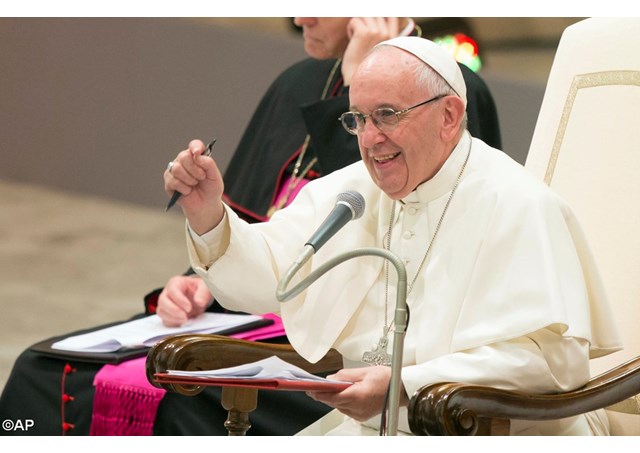
Pope Francis: educate openness to transcendence, practice of mercy

(Vatican Radio) Pope Francis received the participants in a major international congress under the sponsorship of the Congregation for Catholic Education on Saturday morning. For four days this week, more than 2 thousand educators, administrators, students and teachers from around the world have been examining the challenges facing the mission of Catholic education in the 21st century, under the umbrella of Educating today and tomorrow: a passion renewed.
The Conference was organized in connection with 50th anniversary celebrations for the II Vatican Council’s document on Catholic education: Gravissimum educationis.
Click below to hear our report
In lieu of prepared remarks, Pope Francis held a question-and-answer session with a select few of the people taking part, fielding queries on a wide array of topics ranging from the challenges of maintaining Christian identity in an educational setting across all social, political and cultural contexts, to the dissolution of the ties that historically have bound together family, school and society, to the specific challenges to education posed by the “piecemeal III World War” being fought around the world, to which Pope Francis has made repeated reference.
“Today there is a tendency toward a neopositivism,” said Pope Francis, “that is, to educate in immanent things, and this both in traditionally Christian countries and in countries of Pagan tradition.” He went on to say, “Transcendence is what is wanting – for me, the greatest crisis in education, in order that it be [truly, authentically] Christian, is this closure to transcendence.” The Holy Father went on to say, “To prepare hearts, that the Lord might manifest Himself,” is the true mission of the teacher and the goal of all education worthy of the name.
Using the example of St. John Bosco’s “emergency education” in response to the Masonic threat in northern Italy in the 19th century, Pope Francis said, “There are three languages: the language of the head, the language of the heart, and the language of the hands; education must go forward by these three ways; instructing in how to think, helping students to feel well; accompanying students as they do [what they have learned or are learning to do].” He added, “The three languages must be in harmony: that the child, the student think [about] what he feels and does, feel that which he thinks and makes, and do that which he thinks and feels.”
The Holy Father concluded with an appeal and an assignment for the educators present and for all their colleagues, everywhere: to respond to the brutalities of war in contemporary life, by committing themselves anew to learning and teaching mercy, especially the fourteen Works of Mercy. “Think through once again the works of mercy,” he said, “they are the work of the Father.”
| All the contents on this site are copyrighted ©. |


